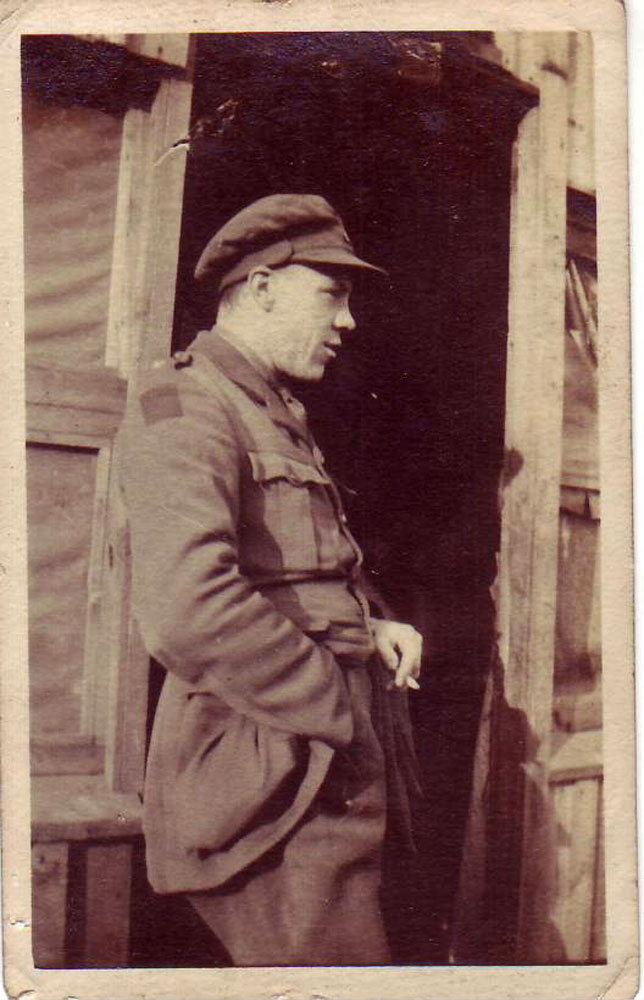
Lieutenant Thomas Ginger. Signals Officer. 4th Battalion.
Thomas Ginger was awarded the Military Cross as a result of his bravery during the German ‘Spring Offensive’ of March 1918. In the citation for his award it describes how ‘On the first day his senior Officers were killed and in numerous rear-guard actions he found himself in command of considerable bodies of men’.
One such example is during the retreat across the River Somme near Brie, when Ginger was ordered to take his men and cover the retreat of the remains of the 50th Division. He took his tired men to the far bank and took up positions to hold the advancing Germans back. At the same Lt George Begg, 239/Field Company was wiring the bridge that the retreating men were crossing. As German troops started to appear on the horizon and the last of the Durham Light Infantry crossed the bridge, Begg primed the detonator and pressed the plunger home. Nothing happened. This was repreated three times. When the bridge did blow, Begg looked across the river to see Ginger and his men still focusing fire on their foe. Eventually Ginger managed to construct a rudimentary footbridge, allowing his men to cross to safety.
Explore more memories from the ribbon
-
Capt Frank Walker MC
Frank Walker joined the 4th (Territorial) Battalion East Yorks in Sept 1914. He served as a private in France until being commissioned 2nd Lieutenant in July 1916 with the 11th Battalion East Yorks (2nd Hull Pals). During the 1st Battle of Ypres in April 1915 the 4th Battalion East Yorks were mentioned in a dispatch from Major General Edward Bulfin (Yorkshire Regiment Green Howards) the Commander of the 28th Division. Also mentioned for ‘good service’ in the dispatch were the 8th Battalion Durham Light Infantry and the 4th Battalion Yorkshire Regiment. Frank was promoted to temporary Lieutenant in January 1918 and acting Captain on the 14th October 1918. Frank would survive the war. In November 1917 the Battalion were based at Mont St. Eloi near Arras. It was here leading raiding party action that, in January 1918, Frank would be awarded Military Cross. The award appeared in the London Gazette on the 23th April 1918. The citation read: ‘For conspicuous gallantry and devotion to duty during a daylight raid. He led his party across a long open stretch of ground to the enemy second line. After clearing the enemy trenches and taking prisoners he successfully effected a difficult withdrawal under heavy fire.’
-
Harold Surtees
Jonathan Helm submitted this information about his Great Grandfather, Harold Surtees. Lance Corporal Surtees (2048/200407), was born in West Hartlepool and lived in Great Ayton. He volunteered for service in a local meeting on 2nd September 1914. Serving with the 1st/4th Battalion Yorkshire Regiment, he was posted to France as part of the 50th Northumbrian Division on 18th April 1915. Although little is known of his exact war record, his photograph indicates two wound stripes and the Whitby Gazette when reporting his death noted that he had been “three times wounded and gassed”. The only confirmed record of wounding is in the War Office Casualty List, which was printed in The Times on Wednesday 25th October 1916. This is likely to have occurred during the Battle of Flers-Courcelette (15th – 22nd September 1916) which was fought during the Battle of the Somme. He died on the 10th April 1918 (aged 26) from wounds sustained when the battalion fought at the Battle of Estaires in an attempt to stop the German advance. Harold is buried at the Haverskerque British Cemetery in France. He left behind his wife, Sarah, and their two children, Harold and Mary.
-
John MacKenzie
Elspeth De Montes told us about her grandad John MacKenzie, a carpenter, who was called up in August 1914. “John had been working as a carpenter for James Bryce in Clephanton since April 1910 when he was called up on 4th August 1914. He enlisted with the Highland Mounted Brigade at Nairn eventually being posted to to Egypt in 1916. He worked chiefly on the wagons, greasing and making slight repairs but he also saw action throughout his time in Egypt. During an air raid at Ramleh on 27th November 1917 5 men were killed along with approximately 100 horses.” John survived his time in Egypt, returning home on 4th April 1919. He kept some of his equipment in the Princess Mary Tin he received during his service. Elspeth still has his Princess Mary tin. He passed away in 1980.
